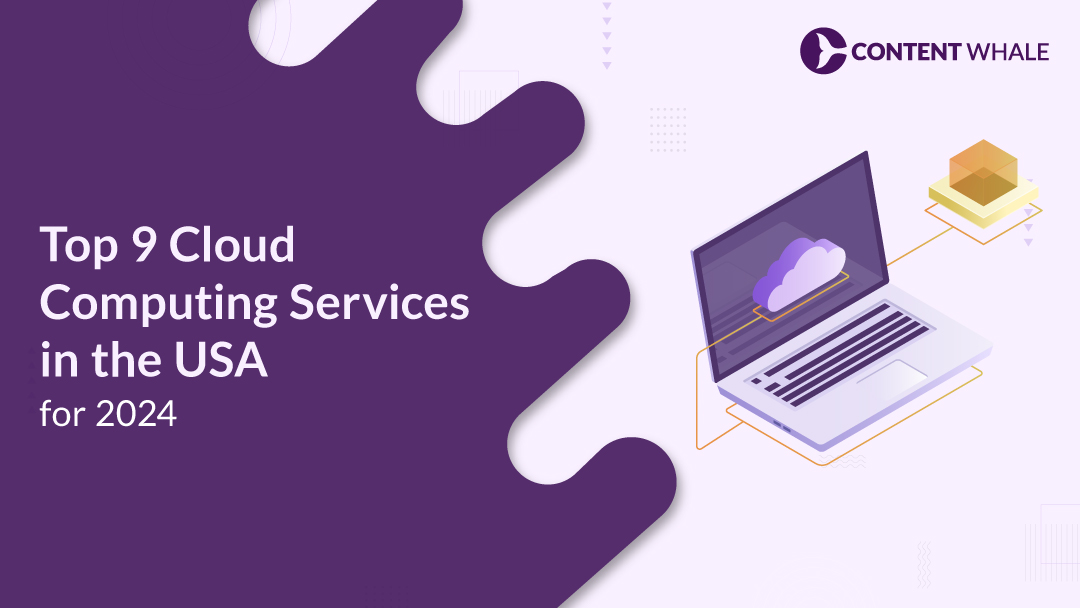Cloud computing has completely changed how businesses handle their data, applications, and services. Today, more companies are adopting top cloud computing services to stay competitive and drive growth.
With the ability to provide flexible, scalable, and secure solutions, these platforms are key for businesses of all sizes. From Amazon Web Services to Microsoft Azure, the best cloud platforms offer a wide range of features to help companies manage their workloads more efficiently.
Choosing from the leading cloud providers can be overwhelming, especially with so many options offering everything from IaaS to SaaS. Whether you’re a startup or a large enterprise, the right cloud computing solutions can streamline your operations, enhance data security, and support your digital transformation goals.
In this guide, we’ll explore the top cloud computing services available in the USA to help you make the best decision for your business.
| # | Cloud Computing Service | Key Features | Pricing | Overall Score |
| 1 | Amazon Web Services (AWS) | Extensive global infrastructure, AI/ML tools, broad range of services (SaaS, PaaS, IaaS), high scalability, strong data security features | Pay-as-you-go, Free Tier available | 9.5/10 |
| 2 | Microsoft Azure | Hybrid cloud capabilities, strong AI integration, deep integration with Microsoft products (Office 365, Dynamics 365), wide compliance coverage | Flexible pay-as-you-go pricing | 9.4/10 |
| 3 | Google Cloud Platform (GCP) | AI/ML tools, strong in data analytics, global infrastructure, focus on cloud-based applications, seamless integration with Google services | Starting at $0.1509/hour for VMs | 9.3/10 |
| 4 | IBM Cloud | Focus on hybrid cloud, AI/automation tools, cloud compliance features, strong in blockchain and IoT solutions | Bare Metal Servers from $0.12/hour | 8.9/10 |
| 5 | Oracle Cloud Infrastructure (OCI) | Enterprise-grade cloud, strong database management tools (Autonomous Database), high performance for AI-driven workloads | Starting at ~$99/month for 4 vCPUs | 8.8/10 |
| 6 | Alibaba Cloud | Cost-effective, focus on AI/IoT solutions, expanding global reach, competitive pricing for cloud storage and computing solutions | ECS instances from $4.50/month | 8.7/10 |
| 7 | Salesforce Cloud | Leading in CRM, AI-driven solutions with Einstein AI, strong integration with Sales Cloud and Marketing Cloud | Subscription-based plans starting at $25 | 9.0/10 |
| 8 | Rackspace | Best for managed cloud services, tailored solutions for multi-cloud setups, strong global support for enterprises | Custom pricing based on services | 8.6/10 |
| 9 | DigitalOcean | Best for startups and small businesses, developer-friendly platform, simple UI, cost-effective cloud storage and computing | Starts at $4/month for Droplets | 8.5/10 |
1. Amazon Web Services (AWS)

A) Overview
Amazon Web Services (AWS) remains the largest and most widely adopted cloud service provider, commanding around 33% of the global market share in 2024. Since its launch in 2006, AWS has expanded to provide over 200 fully-featured services for computing, storage, databases, and analytics. It is particularly popular for enterprises looking for reliable, scalable solutions that can handle various workloads, from small startups to multinational corporations.
B) Key Features and Benefits
- Comprehensive Service Offering: AWS provides a vast range of services, including SaaS, IaaS, and PaaS, making it versatile for businesses across industries.
- Scalability: AWS offers the ability to scale both horizontally and vertically, allowing businesses to handle unpredictable workloads seamlessly.
- AI and Machine Learning Tools: AWS offers advanced artificial intelligence cloud services, including Amazon SageMaker for machine learning and Bedrock for generative AI.
- Global Availability: With data centers in over 27 geographic regions, AWS ensures high availability and low latency, critical for businesses requiring rapid, reliable performance.
- Security and Compliance: AWS offers robust security measures such as AWS Shield, AWS Key Management Service (KMS), and multi-factor authentication to ensure top-tier data security.
C) Why AWS Stands Out
- First-Mover Advantage: As one of the first major cloud service companies to enter the market, AWS has maintained its lead through constant innovation and extensive integration options.
- Advanced AI Integration: AWS has heavily invested in AI cloud services, making it a top choice for businesses that need AI-driven solutions to manage their workflows.
- Developer Tools: AWS offers developer-friendly tools that streamline application development, particularly with its serverless and containerized computing services.
D) Pricing
AWS operates on a pay-as-you-go model, which allows businesses to pay only for the resources they use. Here are some typical pricing examples:
- Amazon EC2 (Elastic Compute Cloud): Starts from $0.0058 per hour for t4g.micro instances.
- Amazon S3 (Simple Storage Service): Standard storage is priced at $0.023 per GB for the first 50 TB per month.
- RDS (Relational Database Service): Prices start at $0.017 per hour for db.t4g.micro instance.
2. Microsoft Azure

A) Overview
Microsoft Azure holds the second-largest share of the global cloud market, accounting for approximately 25% of cloud infrastructure spending in 2024. It has become a top choice for enterprises looking for comprehensive cloud computing solutions, offering over 200 services that integrate well with Microsoft’s ecosystem, including Office 365 and Dynamics 365. With a strong focus on AI, Azure has seen significant growth due to its investment in artificial intelligence cloud services and partnerships like the one with OpenAI.
B) Key Features and Benefits
- Hybrid Cloud Capabilities: Azure excels in hybrid cloud deployments, offering seamless integration between on-premise infrastructure and public cloud services.
- AI and Machine Learning: Azure provides AI cloud services, including Azure OpenAI and Cognitive Services, enabling businesses to embed intelligent features like natural language processing and computer vision into their applications.
- Security and Compliance: Azure includes advanced tools like Azure Sentinel for security monitoring and offers extensive compliance certifications, making it a reliable platform for industries with strict regulatory requirements.
C) Why Azure Stands Out
- Enterprise Integration: Azure’s seamless integration with existing Microsoft products, such as Office 365 and Power Platform, makes it a favorite for businesses already using Microsoft’s software.
- AI Leadership: With services like Azure OpenAI and Copilot, Azure has become a leader in AI-powered cloud solutions.
D) Pricing
- Virtual Machines: B1s starts at $7.59/month, while higher-tier machines like B4ms cost $121.18/month.
- Blob Storage: Pricing starts at $0.021 per GB for hot storage and $0.001 for archive storage, making it affordable for various storage needs.
3. Google Cloud Platform (GCP)

A) Overview
Google Cloud Platform (GCP) is a significant player in the cloud market, holding about 11% of global market share in 2024. It stands out as a top choice for businesses that prioritize cloud-based applications and advanced AI-driven solutions. With over 960,000 customers, including startups and enterprises, GCP continues to grow by offering a powerful mix of scalability, security, and advanced technologies like machine learning cloud services.
B) Key Features and Benefits
- Multi-cloud Flexibility: GCP’s Anthos enables seamless management of workloads across multi-cloud environments, including AWS and Azure, providing businesses with flexibility and control.
- AI and Machine Learning: GCP offers cutting-edge AI tools, such as Vertex AI and Gemini AI models, making it ideal for businesses focused on artificial intelligence cloud services and data-driven insights.
- Sustainability: Google Cloud is known for its commitment to environmental responsibility, with data centers powered by renewable energy, helping businesses reduce their carbon footprint.
C) Why GCP Stands Out
- Cost Efficiency: GCP excels in cost-effective solutions, particularly for general-purpose virtual machines, making it an affordable option for businesses.
- Data and Analytics: GCP provides extensive data management and analytics capabilities, offering tools for data storage, streaming, and analysis.
D) Pricing
- General Purpose VM (e2-standard-4): $0.1509/hour.
- Compute Optimized VM (c2-standard-4): $0.2351/hour.
4. IBM Cloud

A) Overview
IBM Cloud is recognized as a leader in hybrid cloud and multi-cloud environments, offering tailored solutions that integrate AI and automation to modernize businesses. IBM Cloud is well-regarded for its enterprise-grade cloud infrastructure, which provides robust security, scalability, and innovative technologies like Red Hat for open-source solutions. It is a popular choice for enterprises that need flexible cloud architecture with strong compliance and security measures.
B) Key Features and Benefits
- Hybrid and Multi-cloud Capabilities: IBM specializes in hybrid cloud strategies, providing tools like IBM Cloud Pak to simplify application management across public, private, and multi-cloud environments.
- Security and Compliance: IBM Cloud places a heavy emphasis on data security, offering built-in tools for cloud compliance and regulatory needs.
- AI and Automation: IBM integrates AI-driven services, such as watsonx and AI-assisted application modernization, making it ideal for businesses seeking to leverage AI for operational efficiency.
C) Why IBM Cloud Stands Out
- Enterprise Expertise: IBM offers industry-specific solutions, making it highly relevant for large-scale organizations.
- Security-First Approach: It is known for its robust data security protocols, which help businesses ensure compliance with industry regulations.
D) Pricing
- Bare Metal Servers: Prices start at $0.12/hour.
- Virtual Server Instances: Pricing for small instances begins at $0.017 per vCPU/hour.
5. Oracle Cloud Infrastructure (OCI)

A) Overview
Oracle Cloud Infrastructure (OCI) is known for providing enterprise-grade cloud solutions, particularly in hybrid cloud and multi-cloud environments. OCI has become a strong contender among the best cloud platforms, offering powerful IaaS and PaaS services tailored for high-performance workloads. In 2024, OCI’s growth continues to outpace many competitors, especially in sectors requiring cloud migration and database management.
B) Key Features and Benefits
- Cost Efficiency: OCI offers highly competitive pricing compared to other providers like AWS and Google Cloud. It charges lower fees for data egress, making it particularly attractive for data-heavy applications.
- Performance and Scalability: OCI is designed for enterprise cloud applications, offering strong performance for AI-driven solutions and machine learning cloud workloads.
- Interoperability: With its multi-cloud capabilities, OCI allows integration with other platforms like Microsoft Azure and Google Cloud, giving businesses flexibility to operate across different ecosystems.
C) Why Oracle Stands Out
- Strong in Data Management: OCI’s Autonomous Database and Exadata Cloud Services are leading options for businesses looking to modernize their database infrastructure with minimal operational burden.
D) Pricing
- Virtual Machines: Start at approximately $99 per month for 4 vCPUs and 16 GB of memory.
- Block Storage: Offers pricing up to 81% less than AWS for comparable storage capacity.
6. Alibaba Cloud
A) Overview
Alibaba Cloud continues to be a major player, especially in the Asia-Pacific region, where it is the leading IaaS provider. Globally, it ranks third, thanks to its strong suite of cloud infrastructure offerings and a focus on driving AI and machine learning cloud adoption. Alibaba Cloud provides an array of cloud computing solutions catering to international businesses, especially those focused on cloud scalability and AI-driven innovations.
B) Key Features and Benefits
- Cost-Effective Solutions: Alibaba Cloud has implemented a new pricing strategy, with reductions of up to 59% on core public cloud services, making it an attractive option for businesses worldwide.
- AI and Big Data Integration: Offers services like PAI-Lingjun, an AI platform for high-performance tasks, and Energy Expert, an AI-driven sustainability solution.
- International Focus: Expanded free usage of Cloud Data Transfer Services, allowing up to 200GB per month for global customers.
C) Pricing
- Elastic Compute Service (ECS): Reduced by up to 30% for pay-as-you-go users.
- Object Storage Service (OSS): 500GB for $16.99/year.
7. Salesforce Cloud

A) Overview
Salesforce Cloud has consistently been a leader in CRM cloud solutions and is expanding its offerings with significant advancements in AI-driven services. The platform provides a wide range of cloud-based applications to improve customer relationship management (CRM), sales, marketing automation, and customer service. In 2024, Salesforce continues to focus on AI integration and data security, making it one of the leading cloud providers.
B) Key Features and Benefits
- AI and Automation: With Einstein AI, Salesforce automates workflows, offering personalized customer interactions through machine learning cloud capabilities.
- Data Security: Salesforce enhances data governance with AI-driven threat detection and encryption, ensuring cloud compliance with industry regulations.
- AppExchange: Salesforce’s AppExchange allows businesses to extend their cloud infrastructure through thousands of third-party applications and integrations.
C) Pricing
Salesforce operates on a subscription-based model. Pricing starts at $25/user per month for basic services, with advanced features available at higher tiers. The Sales Cloud offers more comprehensive solutions starting from $75/user per month, depending on the specific needs and scale of the business.
8. Rackspace
A) Overview
Rackspace is a prominent player in cloud service companies USA, especially known for offering managed cloud solutions. It excels in multicloud and hybrid cloud environments, catering to enterprises with complex IT needs. In 2024, Rackspace launched its Managed Cloud Platform, enabling businesses to outsource their entire cloud infrastructure management across AWS, Microsoft Azure, Google Cloud, and private clouds.
B) Key Features and Benefits
- Fully Managed Services: Rackspace provides comprehensive management across multiple cloud platforms, reducing operational burdens for enterprises.
- Cost Optimization: Their platform includes tools for cost predictability and optimization, helping businesses cut unnecessary expenses while maintaining performance.
- Security and Compliance: Rackspace’s cloud security solutions are designed to ensure data security and regulatory compliance.
C) Pricing
Rackspace offers a flexible, pay-as-you-go model with pricing that varies based on the specific cloud infrastructure used. Services like their Managed Cloud are customizable, with pricing tailored to each client’s needs.
9. DigitalOcean

A) Overview
DigitalOcean is a popular choice among developers and startups, offering a simplified and budget-friendly cloud platform. It is best known for its Droplets, which are virtual private servers that can scale with the needs of small businesses and startups. DigitalOcean’s ease of use and pay-as-you-go pricing make it accessible for those seeking affordable cloud solutions without sacrificing performance.
B) Key Features and Benefits
- Developer-Friendly: DigitalOcean provides a robust platform with API access, Kubernetes, and support for multiple programming environments.
- Scalable Solutions: Offers virtual machines with flexible configurations that suit various workloads, from basic hosting to advanced machine learning cloud applications.
- Cost-Effective: DigitalOcean starts at just $4 per month, making it one of the most affordable cloud providers.
C) Pricing
- Droplets: Starts at $4/month.
- Managed Databases: From $15/month, including automated backups and failover protection.
Conclusion

Choosing the right cloud service is key to maximizing your business’s potential in 2024. The top cloud computing services, from Amazon Web Services to Google Cloud, offer tailored cloud solutions that can meet a wide range of needs—from data security to machine learning cloud capabilities.
Whether you seek a multi-cloud setup or a hybrid solution combining public and private cloud environments, these platforms deliver the flexibility, scalability, and cost-efficiency needed to support digital transformation. As cloud technologies evolve, investing in the right platform now ensures your business can thrive in this fast-changing digital era. Let us help you select the best solution for your needs.
______
This blog is crafted by Content Whale, your trusted partner for high-impact, SEO-optimized content that delivers measurable results. If you’re looking to elevate your brand, boost your rankings, and outpace the competition, we’re here to help. Contact us today, and let’s create content that drives success and takes your business to the next level.
FAQs
1. What is the best cloud computing service in the USA?
Amazon Web Services (AWS) consistently ranks as the top choice for businesses in the USA due to its wide range of services and scalable infrastructure. Its vast global reach, reliable performance, and advanced features like AI services make it highly favored among enterprises of all sizes.
2. How do I choose between AWS, Azure, and Google Cloud?
AWS is ideal for businesses seeking flexibility and a wide array of services, while Microsoft Azure is preferred for its hybrid cloud capabilities and strong integration with Microsoft products. Google Cloud is best suited for companies looking to leverage AI and data analytics tools for data-driven decision-making.
3. Which cloud provider is best for small businesses?
DigitalOcean is widely recommended for startups and small businesses due to its affordability and simplicity. It offers robust, developer-friendly tools with straightforward pricing, starting as low as $4 per month.
4. What are the key security features of cloud platforms?
Leading cloud providers like AWS, Microsoft Azure, and Google Cloud offer advanced data security features such as encryption, multi-factor authentication, and regular compliance checks to ensure that your data remains secure and compliant with industry standards.
5. Is cloud computing suitable for all industries?
Yes, cloud computing benefits various industries, including healthcare, finance, and retail, due to its flexibility, scalability, and ability to support cloud-based applications that enhance digital transformation across sectors.




![High-quality Content Writing - 12 Content Writing Strategies [2024 Update], content writing techniques, content creation strategies, content marketing tips, SEO content writing, 2024 content trends, audience targeting, user-centric content, blog post structuring, social media content, interactive content, content updates, evergreen content, content research, mobile-friendly content](https://content-whale.com/us/blog/wp-content/uploads/2024/10/BLog-banneer.jpg)
